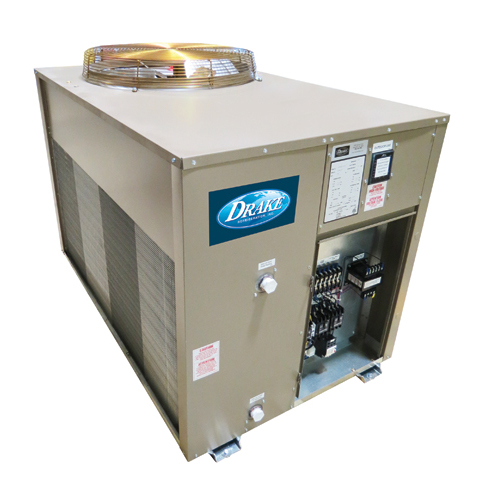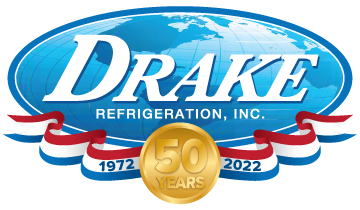
If you’re operating dairy or medical equipment, a brewery, or an industrial process year-round, the right chiller fluid can ensure reliable performance no matter the season. The wrong fluid can result in refrigeration problems in the colder months, compromising chiller performance and reducing uptime. When you need an all-season low-temp chiller, these five types of chiller fluids are ideally suited for year-round operation:
- Propylene glycol and water mixture (10-60%)
- Ethylene glycol and water mixture (10-60%)
- Dynalene HC-10 to HC-50
- Calcium chloride solution
Continue reading to discover more about these low-temp chiller fluids that can maximize uptime all year-round.
Propylene glycol and water chiller fluid mixture (10-60%)
Glycol mixtures have low freezing points, making them act as a chiller’s antifreeze. They are especially helpful for cooling processes below the freezing point of water. Propylene glycol is a non-toxic, food-safe glycol used in a low-temp chiller or above-freezing applications to maintain consistent temperatures and enhance food quality.
Learn more about food-safe glycol chillers.
Ethylene glycol and water fluid mixture (10-60%)
This glycol mixture uses ethylene, a colorless and oily liquid with a mild odor. Ethylene isn’t suitable for food applications due to its mildly toxic properties but can be used as a chiller fluid in many other year-round industrial process cooling applications.
Dynalene HC-10 to HC-50
A water-based and environmentally-friendly chiller fluid, Dynalene HC is another fluid for year-round operation of a low-temp chiller. This non-toxic, non-flammable, and non-hazardous chiller fluid boasts excellent thermal stability at high temperatures, giving it an advantage over glycol mixtures in certain applications.
Calcium chloride solution:
Often used in a low-temp chiller for applications such as ice rinks, a calcium chloride solution is another fluid for year-round operation. It’s highly energy-efficient and offers superior heat transfer properties as compared with glycol. However, calcium chloride can be highly corrosive when not maintained properly, making it essential to follow a routine chiller maintenance schedule when using this chiller fluid.
What about untreated water?
Beyond these four fluids for year-round operation, there’s a fifth type of fluid that deserves honorary mention: untreated water. It didn’t make our list because water poses a couple of limitations. First, it can only be used if a chiller operates solely in the summer, making it unsuitable for year-round operation. Second, untreated water must be paired with a split-system chiller and an indoor evaporator for year-round operation. It’s best to discuss these factors with an industrial chiller expert to ensure you select the best fluids for your operating schedule and chiller configuration.
Which type of chiller fluid is right for you?
There is one essential consideration that can help you narrow down the right low-temp chiller fluid for your application. As a rule of thumb, you want the fluid freeze protection to be the lesser of these two factors:
- 10°F degrees less than the lowest ambient temperature (i.e., if the lowest ambient is -20°F, then you want freeze protection to be at least -30°F)
- 20°F degrees less than the leaving fluid temperature
Learn more about low-temp chiller options that can help you maintain precise temperature control for intense process cooling. We have vast expertise and robust engineered low-temp chiller solutions designed for year-round operation. In addition, our secondary heat exchangers cool a wide array of fluids, including oil, rocket fuel, sulfuric acid, and milk. To learn more about the best chiller fluid for your year-round operation, reach out to our team online or call (888) 289-7299

